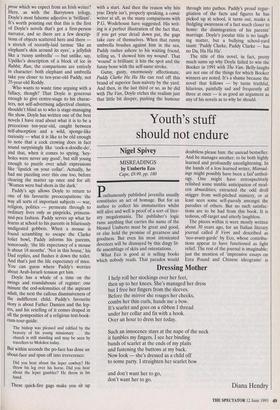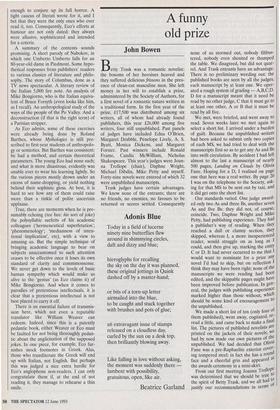Youth's stuff should not endure
Nigel Spivey
MISREADINGS by Umberto Eco Cape, f9.99, pp. 180 Posthumously published juvenilia usually constitutes an act of homage. But for an author to collect his immaturities whilst still alive and well is proof of a sort of liter- ary megalomania. The publisher's logic runs: anything that carries the name of the blessed Umberto must be great and good, or else hold the promise of greatness and goodness. But even his most intoxicated devotees will be dismayed by this dingy lit- tle assemblage of skits and ostentations. What Eco is good at is selling books which nobody reads. That paradox would doubtless please him: the unread bestseller. And he manages another: to be both highly learned and profoundly unenlightening. In the hands of a less learned writer, Misread- ings might possibly have been a fair anthol- ogy. One might have retrospectively relished some nimble anticipation of mod- ern absurdities; extracted the odd droll snigger from well-pitched mimicry, or at least seen some self-parody amongst the parodies of others. But no such satisfac- tions are to be had from this book. It is tedious, off-target and utterly laughless.
The pieces within it were mostly written about 30 years ago, for an Italian literary journal called 11 Verri and described as `neo-avant-garde' by Eco, whose contribu- tions appear to have functioned as light relief. The rest of the journal is imaginable: just the mention of 'impressive essays on Ezra Pound and Chinese ideograms' is enough to conjure up its full horror. A tight caucus of literati wrote for it, and I bet that they were the only ones who ever read it, too. Consequently, Eco's efforts at humour are not only dated: they always were allusive, sophisticated and intended for a coterie.
A summary of the contents sounds promising. A short parody of Nabokov, in which one Umberto Umberto falls for an 80-year-old dame in Piedmont. Some hypo- thetical responses from publishers' readers to various classics of literature and philo- sophy. The story of Columbus, done as a TV news spectacular. A literary review of the Italian 5,000 lire note. An analysis of Mike Bongiorno, who is the Italian equiva- lent of Bruce Forsyth (even looks like him, as I recall). An anthropological study of the ways of the people of the Po Valley. And a deconstruction (if that is the right term) of a Parisian stripper.
As Eco admits, some of these exercises were already being done by Roland Barthes, whose Mythologies is still pre- scribed to first-year students of anthropolo- gy or semiotics. But Barthes was consistent: he had a method, and certain theoretical parameters. The young Eco had none such; and what is more disastrous, evidently was unable ever to wear his learning lightly. So the various pieces mostly drown under an excess of name-dropping, or yield nothing behind their sophistic gloss. At best, it is hard to see how any of them could raise more than a tinkle of polite uncertain applause.
True, there are moments when he is pre- sumably echoing (tee hee: his sort of joke) the polysyllabic surfeits of his academic colleagues (`hermeneutical superfetation'; `phenomenology% `medianness of inten- tional implication', etc), with a view to amusing us. But the simple technique of bringing academic language to bear on subjects unaccustomed to such attention ceases to be effective once it loses its own standard of clarity and commmonsense. We never get down to the levels of basic human sympathy which would make us alive to the 'genius' (as Eco claims it) of Mike Bongiorno. And when it comes to parodies of pretentious intellectuals, it is clear that a pretentious intellectual is not best placed to carry it off.
There is an essential failure of transmis- sion here, which not even a reputable translator like William Weaver can redeem. Indeed, since this is a patently pedantic book, either Weaver or Eco must be faulted for not being thoroughly pedan- tic about the anglicisation of the supposed jokes. In one piece, for example, Eco fur- nishes mock footnotes in Greek. Alas, those who transliterate the Greek will end up with Italian, not English. But perhaps this was judged a nice extra hurdle for Eco's anglophone non-readers. I can only congratulate them if, at the end of not reading it, they manage to rehearse- a thin smile.



































































 Previous page
Previous page